桃花源记英文翻译
从译者主体性角度赏析《桃花源记》六种英译文

从译者主体性角度赏析《桃花源记》六种英译文[摘要]译者的主体性是近来翻译界研究的重点之一。
译者的主体性主要表现在译者的选择性、译者的理解和表达以及译者的创造性叛逆等三方面。
本文试从译者的主体性角度赏析林语堂、Davis、方重、罗经国、孙大雨、谢百魁等六人的《桃花源记》英译文。
[关键词]翻译;译者;主体性;《桃花源记》陶渊明的《桃花源记》是我国古典文学百花园里的一朵奇葩,它以诗体形式写成,笔法凝练,陈述低调而富于诗意,音韵优美,读起来朗朗上口,有言有尽而意无穷之感,为世人传诵。
国内外众多译者各展才华,为我们奉献了琳琅满目的精彩译文。
林语堂、Davis、方重、罗经国、孙大雨、谢百魁等六人对《桃花源记》英译文就各有千秋,富有代表性。
一、译者的文化地位问题在翻译理论的发展过程中,上世纪80年代,纽马克(Peter Newmark)将符号学、功能语法和跨文化交际理论应用于翻译研究,提出了语义翻译和交际翻译的概念。
上世纪70、80年代以巴斯奈特和勒弗维尔为代表的翻译研究派中文化学派提出“翻译是文化内部与文化之间的交流”、“在文化功能等值的过程中,译者有较大的主动权,可以灵活重写甚至打破原文的文学形式”、“翻译就是文化‘改写’(rewrite),‘改写’使原文的生命得以延续”等具有颠覆性的观点,使译者作为翻译活动的主体,提升到了“操纵者”的地位,译者的主体性得到越来越多的重视。
查明建在《论译者主体性——从译者文化地位的边缘化谈起》一文中对“译者主体性”作了这样的界定:“译者主体性是指作为翻译主体的译者在尊重翻译对象的前提下,为实现翻译目的而在翻译活动中表现出的主观能动性。
[1]19-20其基本特征是翻译主体自觉的文化意识,人文品格和文化、审美创造性”。
常青认为译者的主体性主要表现在译者的选择性、译者的理解和表达以及译者的创造性叛逆这三方面。
[2]53本文试图从译者的选择性、译者的理解和表达以及译者的创造性叛逆性三方面赏析林语堂、Davis、方重、罗经国、孙大雨、谢百魁等六位译者的《桃花源记》英译文。
陶渊明桃花源记翻译

陶渊明桃花源记翻译(实用版)编制人:__________________审核人:__________________审批人:__________________编制单位:__________________编制时间:____年____月____日序言下载提示:该文档是本店铺精心编制而成的,希望大家下载后,能够帮助大家解决实际问题。
文档下载后可定制修改,请根据实际需要进行调整和使用,谢谢!并且,本店铺为大家提供各种类型的经典范文,如教学教案、阅读试题、诗歌鉴赏、教学随笔、日记散文、语录句子、报告总结、故事大全、作文大全、其他范文等等,想了解不同范文格式和写法,敬请关注!Download tips: This document is carefully compiled by this editor.I hope that after you download it, it can help you solve practical problems. The document can be customized and modified after downloading, please adjust and use it according to actual needs, thank you!In addition, this shop provides you with various types of classic sample essays, such as teaching lesson plans, reading questions, poetry appreciation, teaching essays, diary essays, quotations sentences, report summaries, stories, essays, other essays, etc. If you want to know the difference Please pay attention to the format and writing of the sample essay!陶渊明桃花源记翻译陶渊明桃花源记翻译导语:陶渊明字元亮,又名潜,私谥“靖节“,世称靖节先生。
《桃花源记》中英文对照

桃花源记晋太元中,武陵人捕鱼为业。
缘溪行,忘路之远近。
忽逢桃花林,夹(jiā)岸数百步,中无杂树,芳草鲜美,落英缤纷。
渔人甚异之。
复前行,欲穷其林。
林尽水源,便得一山,山有小口,仿佛若有光。
便舍(shě)船,从口入。
初极狭,才通人。
复行数十步,豁(huò)然开朗。
土地平旷,屋舍(shè)俨(yǎn)然,有良田美池桑竹之属。
阡(qiān)陌(mò)交通,鸡犬相闻。
其中往来种(zhòng)作,男女衣着(zhuó),悉如外人。
黄发垂髫(tiáo),并怡然自乐。
见渔人,乃大惊,问所从来。
具答之。
便要(yāo)还家,设酒杀鸡作食。
村中闻有此人,咸(xián)来问讯。
自云先世避秦时乱,率妻子邑(yì)人来此绝境,不复出焉,遂与外人间隔。
问今是何世,乃不知有汉,无论魏晋。
此人一一为具言所闻,皆叹惋。
余人各复延至其家,皆出酒食。
停数日,辞去。
此中人语(yù)云:“不足为外人道也。
”既出,得其船,便扶向路,处处志之。
及郡下,诣(yì)太守,说如此。
太守即遣人随其往,寻向所志,遂迷,不复得路。
南阳刘子骥(jì),高尚士也,闻之,欣然规往。
未果,寻病终。
后遂无问津者。
字词详解太元:东晋孝武帝司马曜(yào)的年号(376~396)。
世外桃源:指一种空想的脱离现实斗争的美好世界。
世外桃源是一个人间生活理想境界的代名词,相当于西方的极乐世界或者天堂。
千百年来,完美主义者无不苦苦追寻、刻意营造自己想象中的“世外桃源”。
(作者的这一社会理想是对当时黑暗社会的批判,在客观上也反映了人民摆脱压迫、摆脱剥削的要求。
具有一定的积极意义;但它又有一定程度的复古倾向,在阶级社会中也只能是一种幻想,是不可能实现的。
)比喻不受外面影响的生活安乐、环境幽静的美好地方。
一般作主语、宾语、定语。
武陵:古代郡名。
今湖南常德一带。
为业:以……为生。
桃花源记 完整译本

陶渊明《桃花源记》(数种不同版本的英译文)fect, who immediately sent people to look for the place, with the fisherman as a guide. However, the marks he had left could no longer be found. They got lost and could not find the way.Liu Ziji of Nanyang[3] jun, a learned scholar of high repute, was excited when he heard the fisherman's story. He devised a plan to find the village, but it was not carried out. Liu died soon afterwards, and after his death, no one else made any attempt to find it.Notes:1. Taiyuan was the title of the reign of Emperor Xiaowu of the Eastern Jin Dynasty (376-396).2. Wuling is today's Changde City, Hunan Province.3. Nanyang is today's Nanyang City, Henan Province.About the author:Tao Yuanming (365-427) was a great poet during the Eastern Jin Dynasty, and was born in Jiujiang County, Jiangxi Province. Dissatisfied with the politics of his time, he resigned from his post as magistrate of Pengze County. He retired to his home village and lived there for the next twenty-three years till his death. This piece of writing is regarded as one of the earliest pieces about Utopianism in Chinese literature.例外三个翻译版本:Peach-Blossom Source(translated by A. R. Davis)During the Taiyuan period (376--396) of Jin a man of Wuling, who made his living as a fisherman, ascended a stream, forgetful of the distance he traveled. Suddenly he came upon a grove of peach trees in blossom. They lined the banks for several hundred paces: among them were no other kinds of tree. The fragrant herbage was fresh and beautiful; fallen blossom lay in profusion. The fisherman, in extreme wonder, again went forward, wishing to go to the end of the grove,. The grove ended at the stream\'s source, and there he found a hill. In the hill was a small opening from which a light seemed to come. So he left his boat and went in through the opening. At first it was very narrow, barely allowing a man to pass, but as he went on for some tens of paces, it came out into the open air, upon lands level and wide with houses of a stately appearance. There fine fields and beautiful pools, clumps of mulberries and bamboos. The field dykes intersected; cocks crowed and dogs barked to each other. The clothes of the men and women who came and went, planted and worked among them were entirely like those of people outside. The white-haired and the children with their hair in tufts happily enjoyed themselves.When they saw the fisherman, they were greatly surprised and asked from what place he came. When he had answered all their questions, they invited him to come back to their home, where they set out wine, killed a chicken and made a meal. When the villagers heard of this man, they all came to pay their respects. They told him that their ancestors, fleeing from the troubles during the Qin period (221BC--208BC), had brought their wives and children and neighbours to thisinaccessible spot and had not gone out again. Thus they became cut off from陶渊明《桃花源记》(数种不同版本的英译文)people outside. They asked what dynasty it was now: they did not know that there had been Han (206 BC--220AD, nor of courts Wei (220--265AD) or Jin. The fisherman told them all he knew, item by item, and at everything they sighed with grief. The others in turn also invited him to their homes, and all set out wine and food. He stayed for several days and then took leave of them. The people of this place said to him: "You should not speak of this to those outside."When he had gone out, he found his boat and folllowed the route by which he had come: everywhere he noted the way. When he reached the commandery, he called on the prefect and told him this story. The prefect immediately sent a man to go with him and seek out the places he had previously noted, but they went astray and could not find the way again.Liu Ziji of Nanyang, who was a scholar of lofty ideals, heard of it and joyfully planned to go. Soon after, before he had carried out his plan, he fell ill and died. Afterwards there was no one who "sought the ford".The Peach Colony(translated by Lin Yutang 林语堂)During the reign of Taiyuan of Chin, there was a fisherman of Wuling. One day he was walking along a bank. After having gone a certain distance, he suddenly came upon a peach grove which extended along the bank for about a hundred yards. He noticed with surprise that the grove had a magic effect, so singularly free from the usual mingling of brushwood, while the beautifully grassy ground was covered with its rose petals. He went further to explore, and when he came to the end of the grove, he saw a spring which came from a cave in the hill, Having noticed that there seemed to be a weak light in the cave, he tied up his boat and decided to go in and explore.At first the opening was very narrow, barely wide enough for one person to go in. After a dozen steps, it opened into a flood of light. He saw before his eyes a wide, level valley, with houses and fields and farms. There were bamboos and mulberries; farmers were working and dogs and chickens were running about. The dresses of the men and women were like those of the outside world, and the old men and children appeared very happy and contented. They were greatly astonished to see the fisherman and asked him where he had come from. The fisherman told them and was invited to their homes, where wine was served and chicken was killed for dinner to entertain him. The villagers hearing of his coming all came to see him and to talk. They said that their ancestors had come here as refugees to escape from the tyranny of Tsin Shih-huang (builder of Great Wall) some six hundred years ago, and they had never left it. They were thus completely cut off from the world, and asked what was the ruling dynasty now. They had not even heard of the Han Dynasty (two centuries before to two centuries after Christ), not to speak of the Wei (third century A.D.) and the Chin (third and fourth centuries). The fisherman told陶渊明《桃花源记》(数种不同版本的英译文)them, which they heard with great amazement. Many of the other villagers then began to invite him to their homes by turn and feed him dinner and wine.After a few days, he took leave of them and left. The villagers begged him not to tell the people outside about their colony. The man found his boat and came back, marking with signs the routehe had followed. He went to the magistrate\'s office and told the magistrate about it. The latter sent someone to go with him and find the place. They looked for the signs but got lost and could never find it again. Liu Tsechi of Nanyang was a great idealist. He heard of this story, and planned to go and find it, but was taken ill and died before he could fulfill his wish. Since then, no one has gone in search of this place.Peach-Blossom Springs。
桃花源记_中英文对照

见渔人,乃大惊,问所从来,具答 之。
• The fisherman was then spotted by a villager, who was greatly amazed and asked where he had come from. The fisherman replied in detail.
阡陌交通,鸡犬相闻。其中往来种 作,男女衣着,悉如外人;黄发垂 髫,并怡然自乐 。
• Under his feet country paths crisscrossed, and crowing of roosters and barking of dogs could be heard around. Men and women working in the fields were all clad in outfit of exotic style , while the elderly and the little both seem to enjoy themselves .
夹岸数百步,中无杂树﹐芳草鲜美, 落英缤纷。
• On either bank for several hundred yards there were no other kinds of trees. Petals of the dazzling blossoms were falling upon the exquisite carpet of lush grass .
南阳刘子骥;高尚士也;闻之,欣然规 往。未果,寻病终。后遂无问津者。
• Liu Ziji of Nanyang, a scholar of noble taste, readily planned an excursion to the place upon hearing the story. Before he was anywhere close to the destination, illness claimed his life. After that, no one made the same attempt again .
翻译鉴赏批评之桃花源记英译文的批评赏析
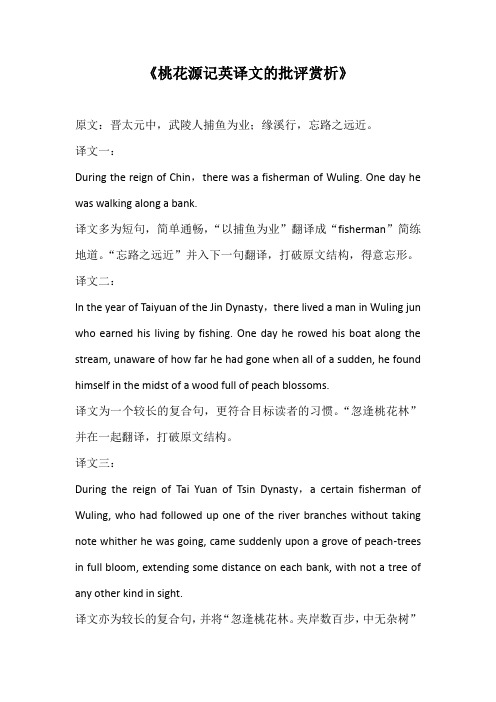
《桃花源记英译文的批评赏析》原文:晋太元中,武陵人捕鱼为业;缘溪行,忘路之远近。
译文一:During the reign of Chin,there was a fisherman of Wuling. One day he was walking along a bank.译文多为短句,简单通畅,“以捕鱼为业”翻译成“fisherman”简练地道。
“忘路之远近”并入下一句翻译,打破原文结构,得意忘形。
译文二:In the year of Taiyuan of the Jin Dynasty,there lived a man in Wuling jun who earned his living by fishing. One day he rowed his boat along the stream, unaware of how far he had gone when all of a sudden, he found himself in the midst of a wood full of peach blossoms.译文为一个较长的复合句,更符合目标读者的习惯。
“忽逢桃花林”并在一起翻译,打破原文结构。
译文三:During the reign of Tai Yuan of Tsin Dynasty,a certain fisherman of Wuling, who had followed up one of the river branches without taking note whither he was going, came suddenly upon a grove of peach-trees in full bloom, extending some distance on each bank, with not a tree of any other kind in sight.译文亦为较长的复合句,并将“忽逢桃花林。
《桃花源记》翻译

《桃花源记》翻译《桃花源记》是唐代诗人陶渊明所写的一篇散文,讲述了一个神秘的桃花源,和里面居民和谐共处的故事。
以下是《桃花源记》的翻译和相关参考内容:There is a mysterious place called Peach Blossom Spring, wherethe mountains are green and the water is clear. The birds sing and the flowers bloom all year round. The people living there are content and peaceful, having everything they need for a simple life. The story goes that one day, a fisherman stumbled upon this place and was welcomed by the friendly locals. He stayed there for a few days and was amazed by the beauty and tranquility of the place.这里有一个神秘的地方,叫做桃花源,山峦碧绿,水清澈见底。
四季花开鸟鸣,居民过着安逸祥和的生活,拥有一切简单生活所需的东西。
据说有一天,一位渔夫偶然发现了这个地方,并受到了友好居民的欢迎。
他在这里住了几天,被这个地方的美丽和宁静所震撼。
The villagers had been living in isolation for centuries, cut off from the outside world. They had their own customs and traditions, and had no interest in wealth or power. They lived in harmony with nature and each other, with no conflicts or wars.这些居民已经与外界隔绝了几个世纪,有着自己的习俗和传统,对财富或权力没有兴趣。
《桃花源记》汉译英
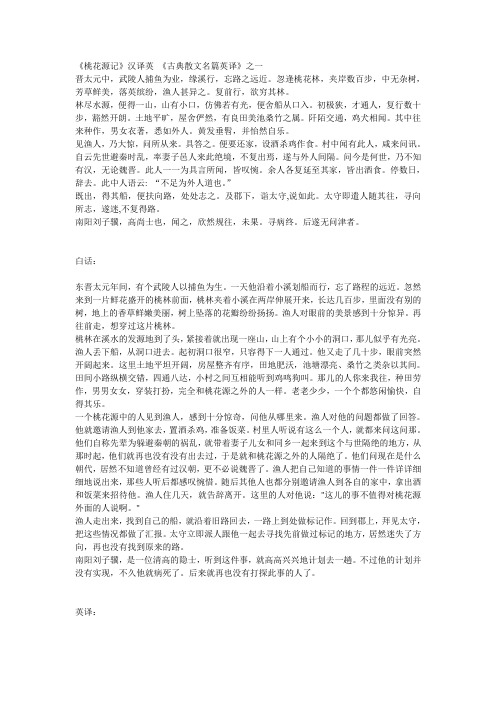
《桃花源记》汉译英《古典散文名篇英译》之一晋太元中,武陵人捕鱼为业,缘溪行,忘路之远近。
忽逢桃花林,夹岸数百步,中无杂树,芳草鲜美,落英缤纷,渔人甚异之。
复前行,欲穷其林。
林尽水源,便得一山,山有小口,仿佛若有光,便舍船从口入。
初极狭,才通人,复行数十步,豁然开朗。
土地平旷,屋舍俨然,有良田美池桑竹之属。
阡陌交通,鸡犬相闻。
其中往来种作,男女衣著,悉如外人。
黄发垂髫,并怡然自乐。
见渔人,乃大惊,问所从来。
具答之。
便要还家,设酒杀鸡作食。
村中闻有此人,咸来问讯。
自云先世避秦时乱,率妻子邑人来此绝境,不复出焉,遂与外人间隔。
问今是何世,乃不知有汉,无论魏晋。
此人一一为具言所闻,皆叹惋。
余人各复延至其家,皆出酒食。
停数日,辞去。
此中人语云: “不足为外人道也。
”既出,得其船,便扶向路,处处志之。
及郡下,诣太守,说如此。
太守即遣人随其往,寻向所志,遂迷,不复得路。
南阳刘子骥,高尚士也,闻之,欣然规往,未果。
寻病终。
后遂无问津者。
白话:东晋太元年间,有个武陵人以捕鱼为生。
一天他沿着小溪划船而行,忘了路程的远近。
忽然来到一片鲜花盛开的桃林前面,桃林夹着小溪在两岸伸展开来,长达几百步,里面没有别的树,地上的香草鲜嫩美丽,树上坠落的花瓣纷纷扬扬。
渔人对眼前的美景感到十分惊异。
再往前走,想穿过这片桃林。
桃林在溪水的发源地到了头,紧接着就出现一座山,山上有个小小的洞口,那儿似乎有光亮。
渔人丢下船,从洞口进去。
起初洞口很窄,只容得下一人通过。
他又走了几十步,眼前突然开阔起来。
这里土地平坦开阔,房屋整齐有序,田地肥沃,池塘漂亮、桑竹之类杂以其间。
田间小路纵横交错,四通八达,小村之间互相能听到鸡鸣狗叫。
那儿的人你来我往,种田劳作,男男女女,穿装打扮,完全和桃花源之外的人一样。
老老少少,一个个都悠闲愉快,自得其乐。
一个桃花源中的人见到渔人,感到十分惊奇,问他从哪里来。
渔人对他的问题都做了回答。
他就邀请渔人到他家去,置酒杀鸡,准备饭菜。
桃花源记英文版
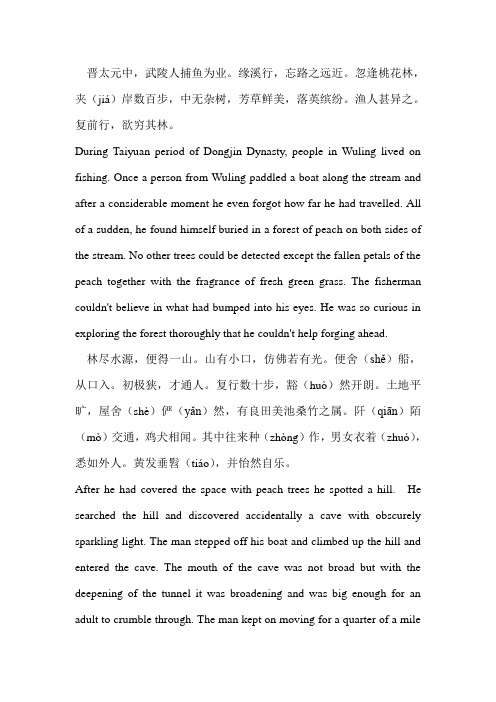
晋太元中,武陵人捕鱼为业。
缘溪行,忘路之远近。
忽逢桃花林,夹(jiá)岸数百步,中无杂树,芳草鲜美,落英缤纷。
渔人甚异之。
复前行,欲穷其林。
During Taiyuan period of Dongjin Dynasty, people in Wuling lived on fishing. Once a person from Wuling paddled a boat along the stream and after a considerable moment he even forgot how far he had travelled. All of a sudden, he found himself buried in a forest of peach on both sides of the stream. No other trees could be detected except the fallen petals of the peach together with the fragrance of fresh green grass. The fisherman couldn't believe in what had bumped into his eyes. He was so curious in exploring the forest thoroughly that he couldn't help forging ahead.林尽水源,便得一山。
山有小口,仿佛若有光。
便舍(shě)船,从口入。
初极狭,才通人。
复行数十步,豁(huò)然开朗。
土地平旷,屋舍(shè)俨(yǎn)然,有良田美池桑竹之属。
阡(qiān)陌(mò)交通,鸡犬相闻。
其中往来种(zhòng)作,男女衣着(zhuó),悉如外人。
从_桃花源记_的英译文看英汉翻译_李珑珑

从《桃花源记》的英译文看英汉翻译李珑珑(湘潭大学外国语学院,湖南湘潭 410000)*摘 要:《桃花源记》脍炙人口,不愧是我国古典文学百花园里的一朵奇葩.汉学家J a m e s凭借自己对中西两种文化,英汉两种语言的透彻理解以及他的本土语言优势,让人以另一种语言欣赏到了桃源世界的美。
文章通过从英汉两种语言及文化方面对比赏析,得出对语言文化差异的准确把握是正确地对古文进行英译的重要条件,并意识到如何最大程度的对古文进行较为完美的英译,争取原文和译文最大限度的等值,翻译工作者更应从译入语读者的视角来思考文化内涵的传递。
关键词:语言;文化;差异;翻译D i s c u s s i o no nT r a n s l a t i o nb e t w e e nE n g l i s ha n dC h i n e s e:A nA p p r e c i a t i o no f t h e T r a n s l a t i o no f T h e S t o r yo f P e a c hb l o o m S p r i n gA b s t r a c t:I t i s n o e x a g g e r a t i o n t h a t t h e w e l l-k n o w n T h e S t o r y o f P e a c hb l o o mS p r i n g i s w o r t hc o n s i d e r i n g a s o n e o f t h e m o s t b e a u t i-f u l f l o w e r s i n t h e g a r d e n o f c l a s s i c l i t e r a t u r e.H a v i n g a g o o d k n o w l e d g e o f t h e l a n g u a g e s a n d c u l t u r e s o f E n g l i s ha n d C h i n e s e a s w e l l a s b e-i n g an a t i v e s p e a k e r o f E n g l i s h,H i g h t o w e r J a m e s,a s i n o l o g i s t,c a nt r a n s l a t e s ow e l l t h a t t h eb e a u t yh a s b e e nr e m a i n e d.B y c o n t r a s t i n g a n d a n a l y s i n gt h e d i f f e r e n c e s b e t w e e nE n g l i s h a n dC h i n e s e,t h e p a p e r c a m e t oa c o n c l u s i o n:a g o o dk n o w l e d g e o f t h e s e t w o t y p e s o f l a n-g u a g e s a n d c u l t u r e s,e s p e c i a l l y o f t h e d i f f e r e n c e s b e t w e e nt h e m,i s v e r y i m p o r t a n t f o r t r a n s l a t o r s t o d o t h e w o r k.;t o g e t a r e l a t i v e l y p e r f e c t t r a n s l a t i o nw i t h a n i n t e n t i o no f a c c o m p l i s h i n g t h e m a x i m u me q u i v a l e n c e,t h e r e b y,t r a n s l a t o r s s h o u l d t r y t o t r a n s m i t t h e c u l t u r a l m e s s a g e s i n t h eo r i g i n a l t e x t t ot h e t a r g e t r e a d e r s i n t h el a t t e r's p l a c e.K e y w o r d s:l a n g u a g e;c u l t u r e;d i f f e r e n c e;t r a n s l a t i o n中图分类号:H315.9 文献标志码:A 文章编号:1000-5757(2008)03-0071-03 《桃花源记》是陶渊明的代表作之一,文章开端,先以美好闲静、“芳草鲜美,落英缤纷”的桃花林作为铺垫,引出一个质朴自然的化外世界。
第一人称桃花源记作文

第一人称桃花源记作文英文回答:As I meander through the lush verdant groves, dappled sunlight filtering through the verdant canopy, an enchanting fragrance of blossoming flowers permeates the air. Before me, nestled amidst a tranquil pool, lies a secluded village enveloped in a veil of ethereal mist. Curiosity compels me closer, and as I approach its serene threshold, a profound sense of tranquility washes over me.The inhabitants of this enigmatic realm greet me with warm smiles and open arms. They introduce themselves as the denizens of Taohuayuan, a hidden paradise shrouded in the annals of Chinese folklore. Their quaint dwellings, adorned with intricate bamboo carvings, harmoniously blend with the surrounding natural beauty, creating a symphony of rustic charm.As I wander through the village, I am struck by itssimplicity and serenity. The absence of worldlydistractions and the embrace of nature's bounty cultivate a palpable sense of inner peace. The villagers share their stories with me, tales of ancient wisdom and profound lessons learned from centuries of harmony with the environment.The children of Taohuayuan play amidst the blooming peach trees, their laughter echoing through the tranquil air, adding to the village's chorus of contentment. The elderly, revered for their wisdom and experience, impart valuable insights, reminding me to live in harmony with both the natural world and my fellow beings.As the sun begins its descent, casting a golden glow upon the village, it is time for me to bid farewell to this idyllic sanctuary. Yet, as I depart, I carry with me a profound gratitude for the glimpse I have been granted into this hidden realm. Taohuayuan has reminded me of the enduring power of community, the importance of simplicity, and the immeasurable value of living in harmony with the world around us.中文回答:沿着葱茏茂密的树丛曲折前行,斑驳的阳光穿过碧绿的树冠,盛开的鲜花散发着醉人的芬芳。
《桃花源记》翻译

《桃花源记》翻译各位读友大家好,此文档由网络收集而来,欢迎您下载,谢谢篇一:桃花源记英文翻译桃花源记英文翻译桃花源记——东晋陶渊明晋太元中,武陵人捕鱼为业。
缘溪行,忘路之远近。
忽逢桃花林,夹岸数百步,中无杂树,芳草鲜美,落英缤纷。
渔人甚异之。
复前行,欲穷其林。
林尽水源,便得一山,山有小口,仿佛若有光。
便舍船,从口入。
初极狭,才通人。
复行数十步,豁然开朗。
土地平旷,屋舍俨然,有良口美池桑竹之属。
阡陌交通,鸡犬相闻。
其中往来种作,男女衣着,悉如外人。
黄发垂髫并恰然自乐。
见渔人,乃大惊,问所从来。
具答之。
便要还家,设酒杀鸡作食。
村中闻有人,咸来问讯。
自云先世避秦时乱,率妻子邑人来此绝境,不复出焉,遂与外人间。
问今是何世,乃不知有汉,无论魏晋。
此人—一为具言所闻,皆叹惋。
余人各复延其家,皆出酒食。
停数日,辞去。
此中人语云:“不足为外人道也。
”既出,得其船,便扶向路,处处志之。
及郡下,诣太守,说如此。
太守即遣人随其往,寻向所志,遂迷,不复得路。
南阳刘子骥,高尚士也,闻之,欣然现往。
未果,寻病终。
后遂无问津者。
《桃花源记》(翻译)东晋太元年间,(有个)武陵人靠捕鱼谋生。
(有一天)他顺着小溪划船,忘了路程的远近。
忽然遇到(一片)桃花林,(桃树)夹在溪流两岸,长达几百步,中间没有别的树。
(地上)芳草鲜艳美丽,落花纷纷。
渔人非常诧异。
再往前走,想走到这林子的尽头。
(桃)林在溪水发源的地方就没有了,(紧接着)就是一座山,山上有个小洞口,(里面)好像有光似的。
(渔人)就离了船,从洞口进去。
初进时,洞口很窄,仅容一个人通过。
又走了几十步,突然(变得)开阔敞亮了。
(这里)土地平坦开阔,房舍整整齐齐,有肥沃的田地、美好的池塘和桑树竹子之类。
田间小路,交错相通,(村落间)能听见鸡鸣狗叫的声音。
人们来来往往耕田劳作,男女的穿戴,完全像桃花源以外的世人。
老人和小孩都充满喜悦之情,显得心满意足。
(那里面的人)见了渔人,竟大吃一惊,问(渔人)从哪里来,(渔人)详尽地回答了他。
桃花源记一二段翻译
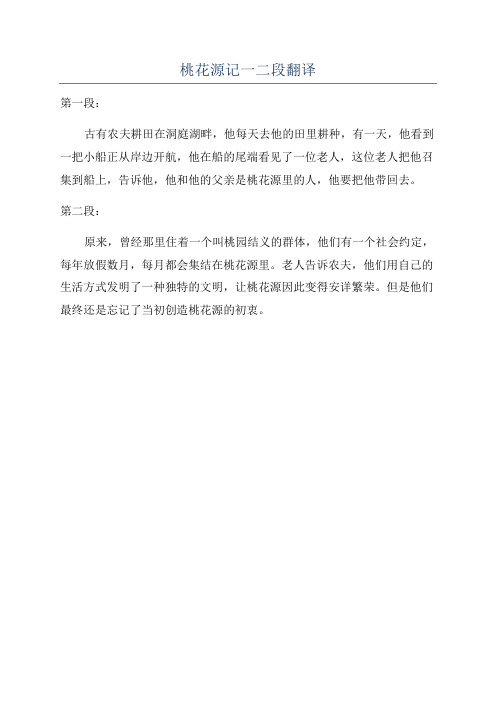
桃花源记一二段翻译
第一段:
古有农夫耕田在洞庭湖畔,他每天去他的田里耕种,有一天,他看到一把小船正从岸边开航,他在船的尾端看见了一位老人,这位老人把他召集到船上,告诉他,他和他的父亲是桃花源里的人,他要把他带回去。
第二段:
原来,曾经那里住着一个叫桃园结义的群体,他们有一个社会约定,每年放假数月,每月都会集结在桃花源里。
老人告诉农夫,他们用自己的生活方式发明了一种独特的文明,让桃花源因此变得安详繁荣。
但是他们最终还是忘记了当初创造桃花源的初衷。
《桃花源记》英译本的对比分析
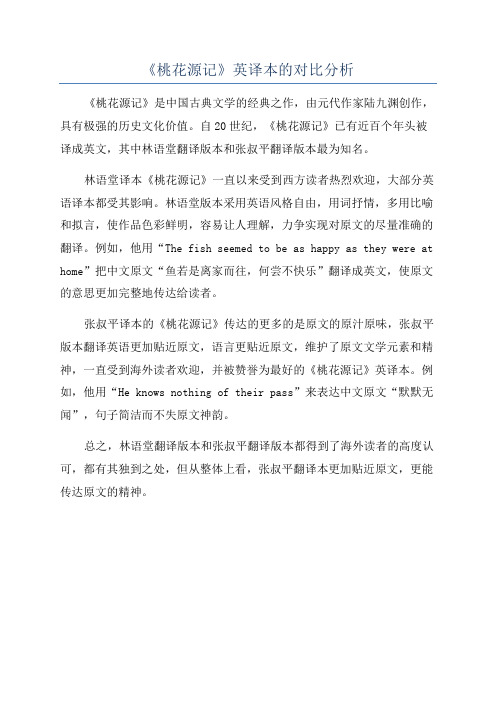
《桃花源记》英译本的对比分析
《桃花源记》是中国古典文学的经典之作,由元代作家陆九渊创作,具有极强的历史文化价值。
自20世纪,《桃花源记》已有近百个年头被译成英文,其中林语堂翻译版本和张叔平翻译版本最为知名。
林语堂译本《桃花源记》一直以来受到西方读者热烈欢迎,大部分英语译本都受其影响。
林语堂版本采用英语风格自由,用词抒情,多用比喻和拟言,使作品色彩鲜明,容易让人理解,力争实现对原文的尽量准确的翻译。
例如,他用“The fish seemed to be as happy as they were at home”把中文原文“鱼若是离家而往,何尝不快乐”翻译成英文,使原文的意思更加完整地传达给读者。
张叔平译本的《桃花源记》传达的更多的是原文的原汁原味,张叔平版本翻译英语更加贴近原文,语言更贴近原文,维护了原文文学元素和精神,一直受到海外读者欢迎,并被赞誉为最好的《桃花源记》英译本。
例如,他用“He knows nothing of their pass”来表达中文原文“默默无闻”,句子简洁而不失原文神韵。
总之,林语堂翻译版本和张叔平翻译版本都得到了海外读者的高度认可,都有其独到之处,但从整体上看,张叔平翻译本更加贴近原文,更能传达原文的精神。
桃花源记英文翻译

left off. The local people living in the Utopia-like cave said to him:
the village was told, all the villagers wanted to inquire what had
happened.
战乱逃避 天下大乱自云先世避秦时乱,率妻子邑人来此绝境,不复出焉;遂与外人间隔。问今是何世,乃不知有汉,无论魏晋。
view instantly clearing up.
土地平旷,屋舍俨然,有良田、美池、桑竹之属;阡陌交通,鸡犬相闻。其中往来种作,男女衣著,悉如外人;黄发垂髫,并怡然自乐。
The land being spacious, houses set out in neat order. On the rich land
晋太元中,武陵人捕鱼为业,缘溪行,忘路之远近。
Once a time there was a fisherman whose native land was called Wuling, in
the Taiyuan Period of Time of the Jin Dynasty [265-420], China. He was
fields where cocks’ crying and dogs’ barking could be faintly heard, and
all the farmers were plowing, sowing or weeding back and forth. The
- 1、下载文档前请自行甄别文档内容的完整性,平台不提供额外的编辑、内容补充、找答案等附加服务。
- 2、"仅部分预览"的文档,不可在线预览部分如存在完整性等问题,可反馈申请退款(可完整预览的文档不适用该条件!)。
- 3、如文档侵犯您的权益,请联系客服反馈,我们会尽快为您处理(人工客服工作时间:9:00-18:30)。
---------------------------------------------------------------最新资料推荐------------------------------------------------------桃花源记英文翻译桃花源记英文翻译桃花源记——东晋陶渊明晋太元中,武陵人捕鱼为业。
缘溪行,忘路之远近。
忽逢桃花林,夹岸数百步,中无杂树,芳草鲜美,落英缤纷。
渔人甚异之。
复前行,欲穷其林。
林尽水源,便得一山,山有小口,仿佛若有光。
便舍船,从口入。
初极狭,才通人。
复行数十步,豁然开朗。
土地平旷,屋舍俨然,有良口美池桑竹之属。
阡陌交通,鸡犬相闻。
其中往来种作,男女衣着,悉如外人。
黄发垂髫并恰然自乐。
见渔人,乃大惊,问所从来。
具答之。
便要还家,设酒杀鸡作食。
村中闻有人,咸来问讯。
自云先世避秦时乱,率妻子邑人来此绝境,不复出焉,遂与外人间。
1/ 8问今是何世,乃不知有汉,无论魏晋。
此人—一为具言所闻,皆叹惋。
余人各复延其家,皆出酒食。
停数日,辞去。
此中人语云:“不足为外人道也。
” 既出,得其船,便扶向路,处处志之。
及郡下,诣太守,说如此。
太守即遣人随其往,寻向所志,遂迷,不复得路。
南阳刘子骥,高尚士也,闻之,欣然现往。
未果,寻病终。
后遂无问津者。
《桃花源记》(翻译)东晋太元年间,(有个)武陵人靠捕鱼谋生。
(有一天)他顺着小溪划船,忘了路程的远近。
忽然遇到(一片)桃花林,(桃树)夹在溪流两岸,长达几百步,中间没有别的树。
(地上)芳草鲜艳美丽,落花纷纷。
渔人非常诧异。
再往前走,想走到这林子的尽头。
(桃)林在溪水发源的地方就没有了,(紧接着)就是一座山,山上有个小洞口,(里面)好像有光似的。
(渔人)就离了船,从洞口进去。
---------------------------------------------------------------最新资料推荐------------------------------------------------------ 初进时,洞口很窄,仅容一个人通过。
又走了几十步,突然(变得)开阔敞亮了。
(这里)土地平坦开阔,房舍整整齐齐,有肥沃的田地、美好的池塘和桑树竹子之类。
田间小路,交错相通,(村落间)能听见鸡鸣狗叫的声音。
人们来来往往耕田劳作,男女的穿戴,完全像桃花源以外的世人。
老人和小孩都充满喜悦之情,显得心满意足。
(那里面的人)见了渔人,竟大吃一惊,问(渔人)从哪里来, (渔人)详尽地回答了他。
(那人)就邀请(渔人)到自己家里去,备酒杀鸡做饭菜(款待他)。
村中的人听说有这样一个人,都来打听消息。
(他们)说祖先(为了)躲避秦时的祸乱,带领妻子儿女及乡邻来到这与人世隔绝的地方,不再从这里出去,于是就与外面的人断绝了往来。
(他们)问起现在是什么朝代,竟然不知道有过汉朝.更不必说魏晋了。
这个人(为他们)详细地介绍了自己所听到的事,<他们听罢)都感叹惋惜。
其余的人也请(渔人)到自己家中,都拿出酒饭来(款待他)。
(渔人在这里)住了几天,就告辞离去。
这里的人告诉(他)说:“(这里的情况)不值得对外边的人说啊。
3/ 8”---------------------------------------------------------------最新资料推荐------------------------------------------------------ (渔人)出来后,找到他的船,就沿着旧路(回去),(一路上)处处做了记号。
回到郡里,去拜见太守,报告了这些情况。
太守立即派人跟他前往,寻找前次做的标记,竞迷失了(方向),再也没找到路。
南阳刘子骥,是高尚的名士;听到这件事,高兴地计划前往,没有实现,不久病死了。
此后就再也没有问路访求(桃花源)的人了。
晋太元中,武陵人,捕鱼为业,缘溪行,忘路之远近,忽逢桃花林。
夹岸数百步,中无杂树,芳草鲜美,落英缤纷。
渔人甚异之。
复前行,欲穷其林。
林尽水源,便得一山。
山有小口,彷佛若有光。
便舍船,从口入。
In Jin Dynasty, there was a man who was engaged in fishing in Wuling. One day he was boating along the band of a river and forgot the time. All of a sudden, a peach forest appeared before him. All the peach trees were blossoming earnestly. The forest was flourishing along the river for severeal hundred feet,5/ 8among which there were only peach trees. Grass was thriving and petals were shed gloriously. The fisherman was considerably astonished and went on to the end of the forest. At the end of the forest there was a hill standing ahead. The fisherman saw a cave that was indistinctly shining. The fisherman therefore left the boat and went through the cave. 初极狭,才通人;复行数十步,豁然开朗。
土地平旷,屋舍俨然。
有良田美池桑竹之属,阡陌交通,鸡犬相闻。
其中往来种作,男女衣著,悉如外人;黄发垂髫,并怡然自乐。
见渔人,乃大惊,问所从来,具答之。
便要还家,设酒杀鸡作食。
村中闻有此人,咸来问讯。
自云先世避秦时乱,率妻子邑人来此绝境,不复出焉;遂与外人间隔。
问今是何世,乃不知有汉,无论魏晋。
此人一一为具言所闻,皆叹惋。
余人各复延至其家,皆出酒食。
停数日,辞去。
此中人语云:“不足为外人道也。
” The tunnel was very narrow in the beginning, only allowing---------------------------------------------------------------最新资料推荐------------------------------------------------------a man to walk through. After walking for about several ten feet, it became spacious. The land was vast and smooth and the houses were orderly located. The farm was fertile and the ponds were crystally delicate. There are also a variety of plants like mulberry and bamboo. The farm ridges were crossing each other and dogs were barking and chicken were crowing everywhere. Men and women busily working were dressed in an alient way. The old and the young were all living happily. When they saw the fisherman, they felt considerably astounded and asked where he came from. The fisherman answered honestly. Then he was hospitably invited into their families and treated with delicious chicken and wine. Other villagers all came to see the fisherman after they knew the news. They told the fisherman that their ancestors led their wives and neighbours to this place in order to avoid the war in Qing Dynasty and never went out again. They asked the fisherman what dynasty it was then. They even did not know the Han Dynasty, not to mention Wei and Jin. The fisherman detailed all he7/ 8knew to the local people and they sighed again and again. Then the fisherman was invited to different families to have meals. After several days, he left the village, told not to tell people outside about this place. 既出,得其船,便扶向路,处处志之。
及郡下,诣太守,说如此。
太守即遣人随其往,寻向所志,遂迷不复得路。
南阳刘子骥,高尚士也,闻之,欣然规往。
未果,寻病终。
后遂无问津者。
After coming out, the fisherman landed on the boat and went along the previous path, marking signs all the way. After reaching his county, he told the deputy everything. The deputy then sent some people to seek the place with the man. But they finally got lost and could no longer reach there. There was a great man named Liu Ziji in Nanyang, who went to seek the place after hearing about it. But he failed at last and passed away with illness before long. Afterwards, nobody went to seek the place again.。
